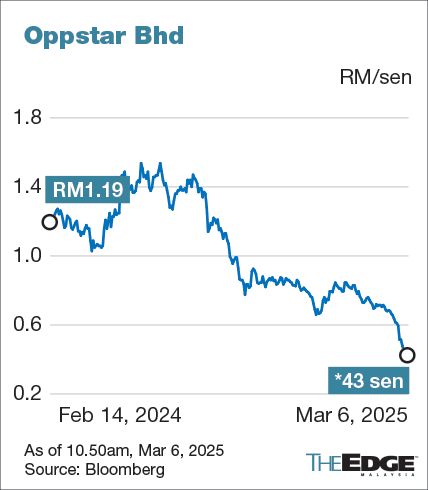
(Photo by Patrick Goh/The Edge)
KUALA LUMPUR (March 6): Analysts predict that Malaysia’s domestic fabless semiconductor companies will be the first to benefit from the groundbreaking partnership between Arm Holdings plc and Malaysia, followed by outsourced semiconductor assembly and test (OSAT) and electronics manufacturing services (EMS) players.
“While this multifaceted transformation is undeniably a complex endeavour, we are positive [about] this game-changing evolution.
“This could eventually drive a transformative waterfall effect across the entire semiconductor value chain, spanning across IC (integrated circuit) designer to equipment manufacturers, OSAT providers and EMS players,” said UOB Kay Hian Research in a note on Thursday.
Malaysia on Wednesday inked a pact to pay the SoftBank Group Corp-backed UK firm US$250 million (RM1.11 billion) over ten years for a slew of semiconductor-related licences and knowhows.
The strategic initiative aims to transition Malaysia from its current role in chip assembly — which holds 13% of the global OSAT market share — to advanced semiconductor production.
By empowering local companies to design their own chips, Malaysia is positioned to achieve targeted semiconductor exports of US$270 billion by 2030.
Kenanga Research echoed these sentiments, noting a structural shift in Malaysia’s semiconductor industry.
The partnership with Arm Holdings signifies a move from back-end operations to front-end chip design, allowing Malaysia to capture more value in the semiconductor supply chain.
At the forefront of beneficiaries are Malaysia’s fabless semiconductor players, who are poised to gain from this groundbreaking initiative.
Kenanga noted that the government has set ambitious targets, eyeing the acquisition of seven compute subsystems (CSS) that are approximately 75% complete in chip design.
These CSS will serve high-growth sectors such as AI data services, autonomous vehicles, Internet of Things (IoT), and robotics. This initiative, described as a “shot in the ARM” by Economy Minister Datuk Seri Rafizi Ramli, represents a shift from traditional brick-and-mortar investments to intellectual property (IP) development.
According to Kenanga Research, the first phase beneficiaries are expected to be Malaysia’s fabless semiconductor companies, including Oppstar Bhd (KL:OPPSTAR), Key Asic Bhd (KL:KEYASIC), and SkyeChip Sdn Bhd.
These companies will gain privileged access to Arm’s IP and compute subsystems, enabling them to develop artificial intelligence (AI)-powered chips, noted the house.
Oppstar, with a team of 300 engineers, specialises in IC design services, offering both front-end and back-end design solutions.
Securing a CSS contract could alleviate its current cost pressures and serve as a catalyst for growth, said Kenanga.
Meanwhile, SkyeChip focuses on advanced silicon IP and application-specific integrated circuits (ASICs), with a strong emphasis on memory interface technologies, supported by 330 engineers.
Key ASIC specialises in ASIC design services, and is backed by 43 employees.
Kenanga believe that these companies are well-positioned to leverage government support for IC-design talent development, and enhance their capabilities in chip design.
Kenanga predicts that in the second phase, OSAT players like Malaysian Pacific Industries (KL:MPI), Inari Amerton Bhd (KL:INARI), and Unisem (M) Bhd (KL:UNISEM) will benefit from increased demand for advanced packaging and testing, as local chip production accelerates, though these opportunities are expected to materialise in three- to four years.
By investing US$250 million over the next decade, Malaysia is making a substantial commitment to this strategic shift. The CSS approach reduces the timeline for chip production to as short as 1.5 years, compared to the typical two- to three years.
Additionally, the government can purchase IP from Arm at a 30%-50% lower cost than private enterprises, achieving better economies of scale.
The collaboration with Arm also provides private enterprises with greater visibility in reaching the “tape-out” stage, where chips are ready for commercial production at a foundry.
This partnership, backed by Arm’s existing relationships with foundries, offers a pathway to success for Malaysia’s semiconductor industry, as it moves up the value chain.
Overall, this endeavour is not without risks for private enterprises due to capital expenditure requirements, but government arrangements help mitigate these risks, said Kenanga.
- Singapore man accused of Nvidia chip fraud wields global connections
- Big US companies went bankrupt at fastest pace since 2010, S&P says
- Chinese tea chain Chagee launches US IPO amid market slump
- Foreign inflow returns to Bursa after nearly two months of outflow
- China escalates trade war as Trump isolates Xi in tariff U-turn
- Putra Heights blaze: Fire Dept studying international best practices in gas pipeline management, safety
- BNM more likely mulling cut to banks' statutory reserves than policy rate — Nomura
- Safe-haven Swiss franc at decade high vs dollar as US-China trade war rages
- High Court upholds acquittal of insurance training consultant on charges of cheating, money laundering involving over RM1.8m
- Asean+3-led agency releases strategic reserve rice to earthquake-hit Myanmar


